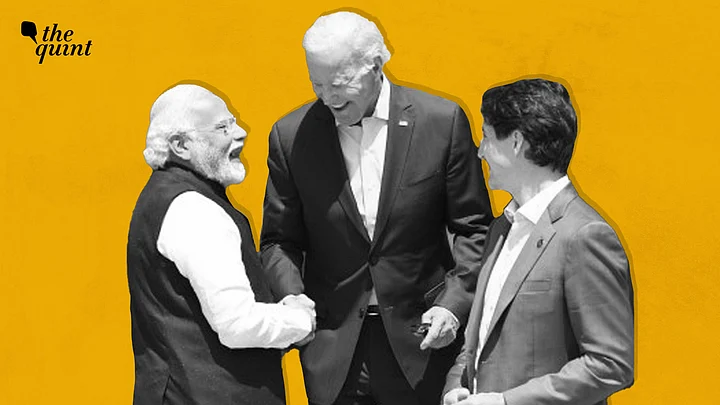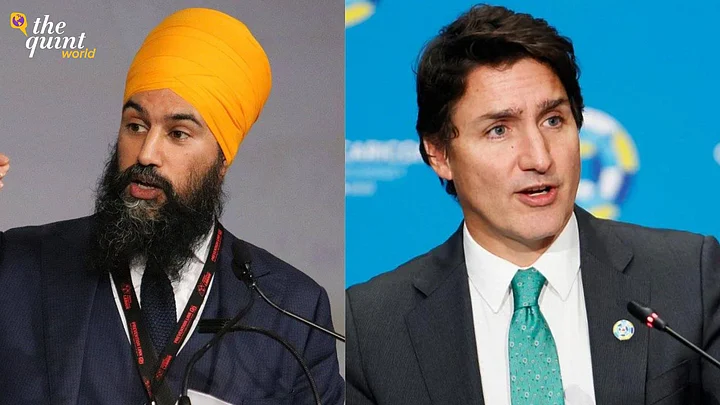A dramatic escalation jolted the already downgraded India-Canada ties with Justin Trudeau naming Indian High Commission officials as 'persons of interest' in the Hardeep Singh Nijjar assassination case.
Testifying before a public enquiry panel on foreign interference, the Canadian prime minister also stated that the allegations he made in September 2023 against Indian officials were based on "intelligence" collected locally and by the Five Eyes (Australia, Canada, New Zealand, the UK, and the US) rather than "hard evidentiary proof".
Interpreting Trudeau's deposition as a vindication of their oft-repeated stance, India's Ministry of External Affairs (MEA) said, "What we have heard today only confirms what we have been saying consistently all along – Canada has presented us (India) no evidence whatsoever in support of the serious allegations that it has chosen to level against India and Indian diplomats."
The MEA further alleged that Trudeau's latest actions were an attempt for him to make 'narrow political gains'.
Even as the diplomatic row between the two countries refuses to blow over, The Quint looks at how this is playing out for Trudeau back home. And how true is the MEA's claim of 'narrow political gains'?
Trudeau's Domestic Political Agenda
While several supporters of Trudeau continue to call for accountability on the part of the Indian government, there has been a shift of support away from Trudeau over the recent escalation with India – with some Opposition leaders and Canadian media outlets buying into the 'political gains' narrative.
Some, however, label that to be an unfair assessment, stating that the escalation was not a political move and that the public explanation – which is that the Royal Canadian Mounted Police (RCMP) investigation led to the decision to expel Indian diplomats – was by far the most likely.
Xavier Delgado, Research Associate at the Canada Institute, says that the Liberals' concerns stem largely from dissatisfaction with the economy instead of loss of support among certain groups.
Canada's economy has been nosediving on the back of high unemployment rates, a severe crunch in housing, and high prices at grocery stores – with many pointing the finger at Trudeau and his government.
"If this were a political move, it would be an ineffective one that barely moves the needle for their [Liberals'] electoral prospects as they were already polling well amongst the Sikh community and this would not net them much new support," Delgado told The Quint.
That being said, there is no taking away from the fact that Trudeau's political career is in deep water.
As per an Ipsos poll published in September, only 33 percent of respondents said that they approved of Trudeau's leadership and only 26 percent of them wanted him to continue as prime minister. On the other hand, 45 percent wanted Conservative leader Pierre Poilievre to helm the top job.
The survey was published on the same day Trudeau's Liberal Party lost two crucial bye-elections – Quebec's LaSalle-Émard-Verdun seat (a former Liberal stronghold) and the Elmwood-Transcona seat in Winnipeg.
The bye-elections were considered a litmus test for Canada's mainstream politicians and the loss came as a huge blow to the PM, with longtime Liberal supporter and strategist Andrew Perez labelling it as "yet another nail" in the coffin of Trudeau's political future.
Pressures From Within His Own Party
Over the last few months, the prime minister has also been facing pressure from within his party to announce that he would not lead the Liberals into the next election. In a recent interview with CBC News, Liberal MP Sean Casey publicly called for Trudeau's resignation.
"The message that I've been getting loud and clear — and more and more strongly as time goes by — is that it is time for [Trudeau] to go. And I agree," he said.
The rising economic uncertainty had also led to Jagmeet Singh's New Democratic Party (NDP) withdrawing support to Trudeau's government on 5 September. With Singh backing out, it has been speculated that Trudeau's decision to escalate matters with India was owing to a ploy to retain the support of Sikhs – with their loyalty now starkly divided between the Liberal Party and the NDP.
"Jagmeet Singh has an agenda. Trudeau is articulating that agenda to speak not to New Delhi but to his constituents within," says Observer Research Foundation (ORF) Vice-President Gautam Chikermane while speaking to The Quint.
On the other hand, Roy Norton, Fellow at the Balsillie School of International Affairs, says that while he believes that the Trudeau government has assiduously cultivated the Sikh community in Canada and that likely affects how the government assesses some of the entreaties made to it by India, he adds that the Canadian government is behaving the only way it responsibly could.
"I do not personally believe that the Trudeau government, in its desire to solidify support among Sikh Canadians, is prepared to look the other way if confronted with evidence that one, several, or many Sikh-Canadians are actively engaged in efforts to dismember India," he said.
"If there is interest in India in repairing the relationship, it is totally counterproductive for officials or commentators in India to dismiss what has happened as having been driven by desire, on the part of the Trudeau government, to solidify its standing with Sikh Canadians."Roy Norton to The Quint
Trudeau Receives Both Criticism and Support at Home Over Escalation With India
Following his comment on the 'evidence' against India, Trudeau received criticism from several quarters, including the Opposition and some local media outlets.
Conservative Party chief Pierre Poilievre took aim at Trudeau for his comments at the public enquiry on Wednesday, 16 October, in which the latter had made controversial statements, saying that several Conservative leaders were engaged in "foreign interference" in Canada's democratic system.
Poilievre accused the prime minister of trying to divert the public's attention from the state of the economy and internal politics of the Liberal Party, further demanding that Trudeau release the names of the politicians he claims are involved in foreign interference.
He also added that Trudeau was himself responsible for facilitating alleged Chinese interference in the country's democratic institutions.
"He (Trudeau) is lying. He is lying to distract from a Liberal caucus revolt against his leadership and revelations he knowingly allowed Beijing to interfere and help him win two elections," Poilievre said on Wednesday, 16 October.
On the other hand, the Toronto Star stated that while Trudeau hasn't always been right about India and is often accused of "coddling" pro-Khalistan separatists for "political reasons", this time he is in the right.
"None of that justifies the alleged actions of the Indian government on Canadian soil. The prime minister had no option but to aggressively expel Indian diplomats this week in the face of that country’s brazen and dangerous disregard for the rule of law in a sovereign nation," an opinion piece in the newspaper read.
Similarly, Globe and Mail said that the Indian government had "crossed a line", and that Canada had no option but to respond decisively.
(At The Quint, we question everything. Play an active role in shaping our journalism by becoming a member today.)




